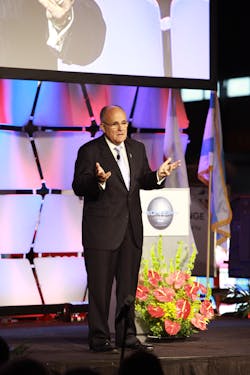Being an effective leader requires having a set of beliefs, knowing your own strengths, having a support team and being genuinely concerned about your fellow man.
These were some of the leadership traits former New York City Mayor Rudy Giuliani offered during his keynote presentation at the National Automatic Merchandising Association (NAMA) OneShow at Chicago’s McCormick Place North.
Speaking to a standing room only crowd, Giuliani offered his insights in elements of leadership. He also reiterated his belief in fiscal responsibility, something he said the current federal government has not provided.
Those NAMA OneShow attendees wishing for an indication of Giuliani’s plans for a presidential bid in 2012 did not receive any indication one way or the other. Giuliani did not mention his plans for 2012 during his talk, but he was asked during the question and answer period.
The former mayor began his talk recalling the early days of his mayorship of New York City, an 8-year period during which the city’s crime declined by 65 percent and the number of welfare recipients fell in half.
While Giuliani brought an extensive background in law enforcement to the role, including working as a federal prosecutor, he faced his greatest leadership test when terrorists destroyed the World Trade Center on Sept. 11, 2011.
Five weeks after the attack, Giuliani related his surprise seeing a Chicago police officer directing traffic in New York City. In questioning the officer, he learned that the Chicago police department sent safety officers to assist his city. “It gives you a sense of what Chicago and America is like,” he said.
Other disasters have occurred since 9/11, Giuliani said, including natural ones like the recent storms in St. Louis, Mo. “It’s all the more reason why people should understand leadership,” he said.
Tailoring his message specifically to the vending audience, Giuliani said he has learned of the numerous government regulations that vending operators have to follow. Excessive government regulation affects many industries, he said, and it is undermining the nation’s economic strength.
“When you have too many regulations, you never regulate the right things,” he said. “There’s an ideology that you can regulate yourself to profitability, you can regulate yourself to growth, you can regulate yourself to safety. None of that is true.”
“That’s the political philosophy that had ruined New York for 30 or 40 years,” he said.
“I believe there is only one thing that will make your industry grow again,” he said. “We have to invest in the private sector.”
“Let’s get rid of regulations that don’t make sense,” he said.
Giuliani said New York City was in a position to respond to the devastation of 9/11 partly because of the renewed strength that occurred under his leadership. “The city came into Sept. 11, thank God, stronger than it was before.”
“Socialism is a self defeating philosophy that locks people into it,” he said. “Taxes not only feed government, it shrinks the private sector,” he said.
Giuliani outlined six principles of leadership.
The first principle of leadership is to have a strong set of goals and beliefs.
“You can’t just wander through a crisis,” he said. This is something he learned from President Reagan.
The way President Obama has handled the war in Libya offers an example of acting without a set of goals and beliefs.
Had the U.S. acted to overthrow Libyan dictator Moammar Gadaffi when the rebels had made early military gains, Gadaffi would have been overthrown.
He said it took three to four weeks for the United Nations to impose a no-fly zone on Libya. At the same time Obama agreed to support the no fly zone, he stated that the U.S. goal is not to remove Gadaffi. “The illogic of this is monumental,” he said.
“We have leadership to make prudent decisions,” Giuliani said. “He (Obama) is kind of formulating it as he goes.”
President Reagan, by contrast, acted on beliefs. “Ronald Reagan wouldn’t have done this,” he said. “He had a guiding vision.”
Giuliani said leaders have to reassess their vision periodically. This holds true for a business as much as a government.
The second element of leadership, he said, is to be an optimist.
Giuliani said after Sept. 11 he refused to give in to his emotions. “You’ve got to be an optimist if you want to get through life and you want to be successful,” he said.
At the same time, a leader has to identify a correct course of action.
The third element of leadership is courage. “Courage is really, really important and highly misunderstood,” he said.
He said courage requires being willing to take risks.
The fourth element of leadership is relentless preparation. He said he learned this from New York City firefighters. Firefighters enter burning buildings equipped with a lot of safety gear and a lot of training.
“See how you can reduce risks,” he said. “Fear should guide you, but fear should alert you to risk.”
The fifth principle of leadership is team work. “Nobody achieves anything without the help of other people,” he said.
Giuliani said one of the first questions a leader asks himself is, “what are my weaknesses?” He then organizes a team that balances his weaknesses.
“Team work is all a matter of blending strengths and weaknesses,” he said.
As mayor, he knew how to address crime, but not budget issues. Hence, he developed a team with expertise in budget areas. “I had to get the best people to help me,” he said.
The sixth principle of leadership is communication. “You cannot expect them (subordinates) to know what you want,” he said. In failing businesses, he said the failure is usually the result of lack of communication.
To be a good leader, one must like and care about others, he said.
The first question Giuliani was asked during the question period was whether he will run for president in 2012.
Giuliani said he believes Obama has been a very ineffective president, and he wants to see him defeated. Giuliani said he will decide if a Republican candidate exists who can defeat Obama before deciding if he will run.
Giuliani said Obama is using his agencies in a way never seen before; he is using executive agencies to enact new laws as a way to circumvent Congress.
Asked what a fair tax rate would be, Giuliani answered somewhere between zero and 50 percent. He said the government should not be the senior partner in the nation’s economy.
He said he is in favor of a flat tax, whereby everyone (except for the poor) pay the same tax rate. He said the poor should pay a lower tax rate, but they should still pay taxes.
Giuliani repeated his belief that government is wasteful, and the more power the government has, the worse off the country becomes. “Every dollar you send to Washington is inefficient,” he said.






